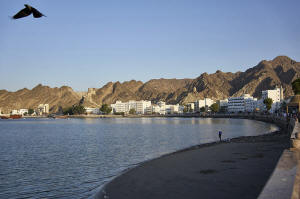Mideast mediator Oman at the center of a key first Iran-US meeting over
Tehran's nuclear program
[April 12, 2025]
By JON GAMBRELL
MUSCAT, Oman (AP) — Once again, some of the highest stakes in Middle
East geopolitics will be discussed in this quiet coastal city without
skyscrapers.
Here in Muscat, the capital of Oman nestled against the sheer stone
heights of the Hajar Mountains, Iran and the United States will meet for
talks over Tehran's rapidly advancing nuclear program for the first time
since President Donald Trump began his second term.
No agreement is immediately likely, but the stakes of the negotiations
couldn't be higher for these two nations closing in on half a century of
enmity. Trump repeatedly has threatened to unleash airstrikes targeting
Iran's nuclear program if a deal isn't reached. Iranian officials
increasingly warn that they could pursue a nuclear weapon with their
stockpile of uranium enriched to near weapons-grade levels.
And at the center is Oman, one of the world's last sultanates on the
eastern edge of the Arabian Peninsula. Its unique history, people and
proximity to Iran have made it indispensable for the West as it has held
discussion after discussion for Iran. But these latest talks — suddenly
announced by Trump in the Oval Office just days earlier — have put Oman
firmly into a spotlight it otherwise seeks to avoid.
“The Omanis have a lot of experience when it comes to playing this
back-channel role,” said Giorgio Cafiero, the CEO and founder of the
Washington-based risk analysis firm Gulf State Analytics. “I think that
right now in this day and age of Trump 2.0, the stakes are really high
and it’s important for us to understand the value of Oman being a
diplomatic bridge.”
‘Omanibalancing’ in an unsettled Mideast
Oman, home to 5.2 million people across an arid country just larger than
Italy, stands out among the Gulf Arab states. Its oil and gas wealth is
marginal by comparison, and its citizens outnumber its population of
foreign workers. Omanis can be found working normal jobs from taxi cabs
to offices. And its people are Ibadi Muslims, a more liberal offshoot of
Islam predating the Sunni-Shiite split.

They occupy a strategic location along the Strait of Hormuz, the narrow
mouth of the Persian Gulf through which a fifth of all oil passes.
And Oman is a former empire whose seafaring rule once stretched all the
way down to the island of Zanzibar off Africa. That history extends into
how it deals with the wider world, said Marc J. O’Reilly, a history
professor at Heidelberg University in Ohio.
It is a path O'Reilly referred to as “Omanibalancing” over 25 years ago
— and one that still works today for the sultanate after the 2020 death
of its longtime ruler Sultan Qaboos bin Said and the installation of
Sultan Haitham bin Tariq.
Oman is “the master of quiet diplomacy," O’Reilly said. “I think they
are proud of that, the Omanis, they know that's their reputation.”
That has been tested in recent years, however. Oman maintains diplomatic
ties to Yemen's Houthi rebels, now being bombed in an intense airstrike
campaign by the Trump administration. Oman's ties to Iran, cemented when
Shah Mohammad Reza Pahlavi sent troops in the 1970s to help put down the
Dhofar Rebellion in the country, have been maintained since the 1979
Islamic Revolution.
America has relied on Oman for years to negotiate with Iran, including
secret talks under President Barack Obama that led to the 2015 nuclear
deal Iran had with world powers.
“Certainly, I think they are, I think on the whole, very easy to deal
with in a region where that is not the norm,” O'Reilly said.
The challenge ahead
This round of talks is unlike those that came before. The first
challenge Oman faces is just how public they are. Muscat typically
relies on discretion in how they handle diplomatic relations, a holdover
from an earlier age of Gulf Arab rule.

[to top of second column]
|

Visitors and locals gather at the Mutrah Corniche in Muscat, Oman,
Friday, April 11, 2025. (AP Photo/ Fatima Shbair)

Their neighbors today in comparison go relatively public with their
diplomacy — like Qatar's role in negotiations with Afghanistan's
Taliban, Saudi Arabia hosting the Russia-U.S. talks and the United
Arab Emirates just mediating a Russia-U.S. prisoner swap. So far,
Oman's state-run media, which dominates the sultanate, has remained
silent about Saturday's talks.
“Oman typically prefers not making too many headlines,” Cafiero
said. “Oman prefers diplomacy that’s not at the forefront of the
news but is still effective.”
Then there's the expectations of the two sides. Iran's Foreign
Minister Abbas Araghchi maintains the negotiations will begin as
indirect talks, likely with Omani Foreign Minister Badr bin Hamad
al-Busaidi passing messages between Tehran and U.S. Mideast envoy
Steve Witkoff. Trump has maintained the talks will be direct. While
not a major roadblock, it signals the challenge the negotiations
face — particularly after years of indirect talks during the Biden
administration went nowhere.
And while the U.S. side can offer sanctions relief for Iran's
beleaguered economy, it remains unclear just how much Iran will be
willing to concede. Under the 2015 nuclear deal, Iran could only
maintain a small stockpile of uranium enriched to 3.67%. Today,
Tehran's stockpile could allow it to build multiple nuclear weapons
if it so chooses and it has some material enriched up to 60%, a
short, technical step away from weapons-grade levels. Judging from
negotiations since Trump unilaterally withdrew America from the deal
in 2018, Iran will likely ask to keep enriching uranium up to at
least 20%.
One thing it won't do is give up its program entirely. That makes
the proposal of Israeli Prime Minister Benjamin Netanyahu of a
so-called Libyan solution — “you go in, blow up the facilities,
dismantle all the equipment, under American supervision, American
execution” — unworkable.
Iranians including Ayatollah Ali Khamenei have held up what
ultimately happened to the late Libyan dictator Moammar Gadhafi, who
was killed with his own gun by rebels in the country's 2011 Arab
Spring uprising, as a warning about what can happen when you trust
the United States.
Already, a top adviser for Khamenei, Ali Shamkhani, has warned what
could happen if the U.S. continues to threaten Tehran, including
Iran expelling inspectors from the International Atomic Energy
Agency and ending cooperation with the U.N. watchdog.

“The transfer of enriched material to a secure location could also
be considered,” he added, opening the door again to Iran having
secret, undeclared nuclear sites as it did when the crisis over its
program began over 20 years ago.
But Majid Takht-e Ravanch, a deputy Iranian foreign minister,
offered a more positive note Friday.
“If the American side refrains from raising unrelated issues and
demands — and abandons threats and intimidation — there is a good
opportunity to reach an agreement," Takht-e Ravanch said, according
to the state-run IRNA news agency.
___
Associated Press writer Amir Vahdat in Tehran, Iran, contributed to
this report.
All contents © copyright 2025 Associated Press. All rights reserved |